Year in Review
Taking a Stand for Journalism
The press continued to face unprecedented attacks during the past year, both in the United States—where the president called the news media “the enemy of the American people” and routinely disparaged legitimate reporting as “fake news”— and abroad, as Mexican journalists were murdered, Turkish journalists languished in jail, and Venezuelan journalists were harassed, assaulted and detained. Through our publications, fellowships and programming, and with colleagues and alumni worldwide, the Nieman Foundation continued to work to promote and elevate the standards of journalism—and demonstrate why the free press is more vital than ever.
The year began with “The Future of News: Journalism in a Post-Truth Era,” a special event in January organized by Harvard President Drew Faust’s office together with the Nieman Foundation and the Shorenstein Center on Media, Politics and Public Policy.
An important examination of the relationship between the press and politics in the Trump administration, the event attracted a full house at Harvard’s Sanders Theatre. Nieman curator Ann Marie Lipinski moderated a far-ranging conversation that alternately described the problems and prescribed possible solutions, with Gerard Baker, editor-in-chief of The Wall Street Journal, Lydia Polgreen, editor-in-chief of The Huffington Post, and David Leonhardt, Op-Ed columnist at The New York Times and leader of the paper’s 2020 Report on the future of Times’ journalism.
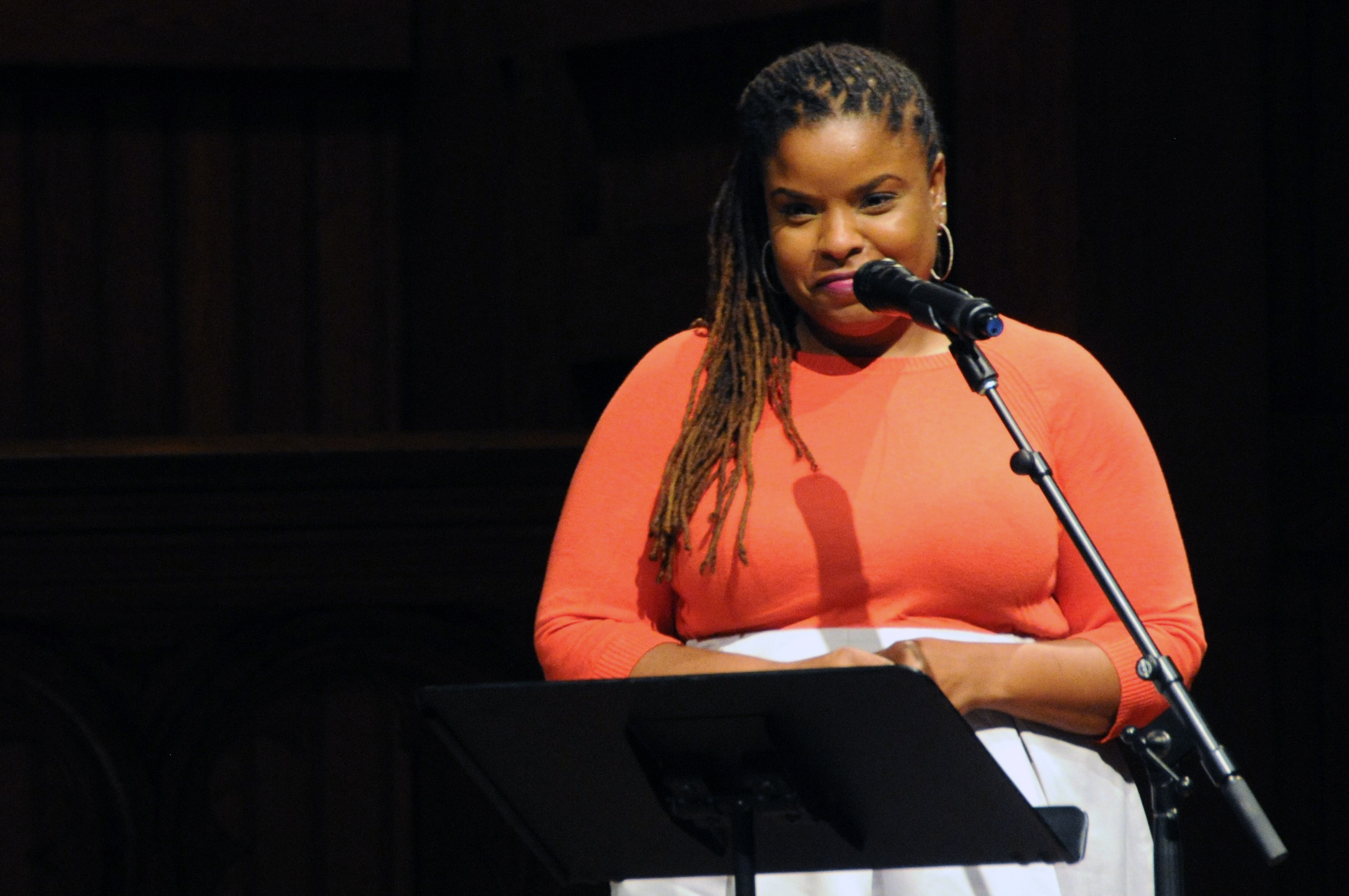
Lolly Bowean
Additional talks by Bill Kristol, editor-at-large at The Weekly Standard, Brian Stelter, senior media correspondent at CNN, and Kathleen Kingsbury, managing editor of digital at The Boston Globe (now with The New York Times), rounded out the program. Our own 2017 Nieman Fellow Lolly Bowean from the Chicago Tribune wowed the crowd with her powerful talk about giving voice to the voiceless and assuring all in attendance that journalists “have the power to empower.”
Following a winter fundraising campaign, we were grateful to receive a new grant of more than $50,000 from the Knight Foundation through its Knight News Match program, with generous donations from many of our alumni and friends to support our work on behalf of journalists and journalism everywhere.
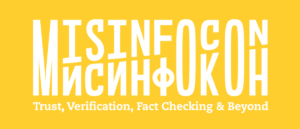 In February, together with First Draft and Hacks/Hackers, Nieman co-hosted a group of journalists, developers, educators, librarians and social psychologists, as well as representatives from the major social media platforms, at “MisinfoCon: Trust, Verification, Fact Checking and Beyond,” a summit and creative studio on misinformation.
In February, together with First Draft and Hacks/Hackers, Nieman co-hosted a group of journalists, developers, educators, librarians and social psychologists, as well as representatives from the major social media platforms, at “MisinfoCon: Trust, Verification, Fact Checking and Beyond,” a summit and creative studio on misinformation.
The weekend began with a series of seven lightning talks at the Nieman Foundation exploring the driving forces behind misinformation and new strategies to strengthen the credibility of information across all media platforms. An off-the-record town hall discussion followed, moderated by Emily Bell, founding director of the Tow Center for Digital Journalism at Columbia, with panelists Craig Silverman, media editor for BuzzFeed News; Brendan Nyhan, political science professor at Dartmouth and a contributor to The Upshot at The New York Times; and Stacy-Marie Ishmael, a John S. Knight Fellow at Stanford and former managing editor for mobile at BuzzFeed News.
The event continued at the MIT Media Lab where participants tackled issues from news literacy to newsroom standards and reader empathy to ad revenue in an effort to find solutions to the problems presented by fake news and disinformation.
Nieman curator Ann Marie Lipinski and former BBC Radio director Helen Boaden, a 2017 Shorenstein Center Fellow, discussed “The Media in the Age of Trump and Brexit” during a talk that examined how political developments in the U.S. and abroad are affecting journalism.
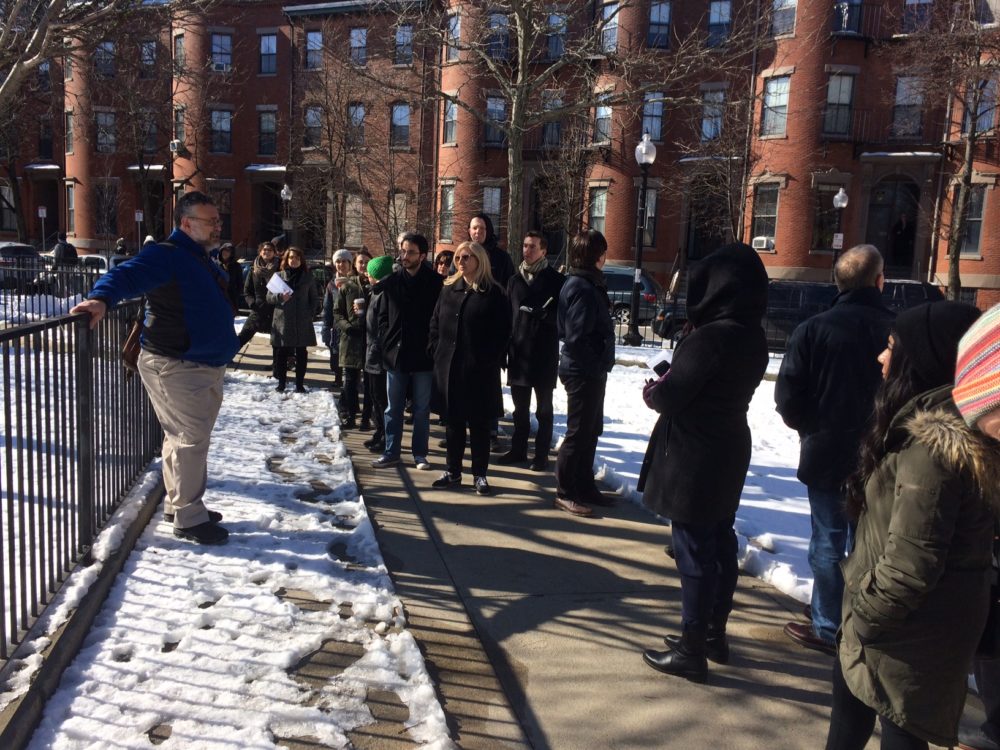
David Luberoff of Harvard's Joint Center for Housing Studies leads a group of journalists on a housing tour of Boston, Mass.
With a grant from the John D. and Catherine T. MacArthur Foundation, and with support from Harvard’s Joint Center for Housing Studies, we organized Covering Housing: A Workshop for Journalists in March. From Nieman curator Ann Marie Lipinski’s conversation with Shaun Donovan—former secretary of HUD and director of the U.S. Office of Management and Budget under President Obama—to a panel discussion including Scott Keller, senior advisor to Donald Trump’s presidential transition team in the nomination and confirmation of Dr. Ben Carson as HUD secretary, the workshop aimed to help journalists expand their thinking around how housing issues intersect with all beats.
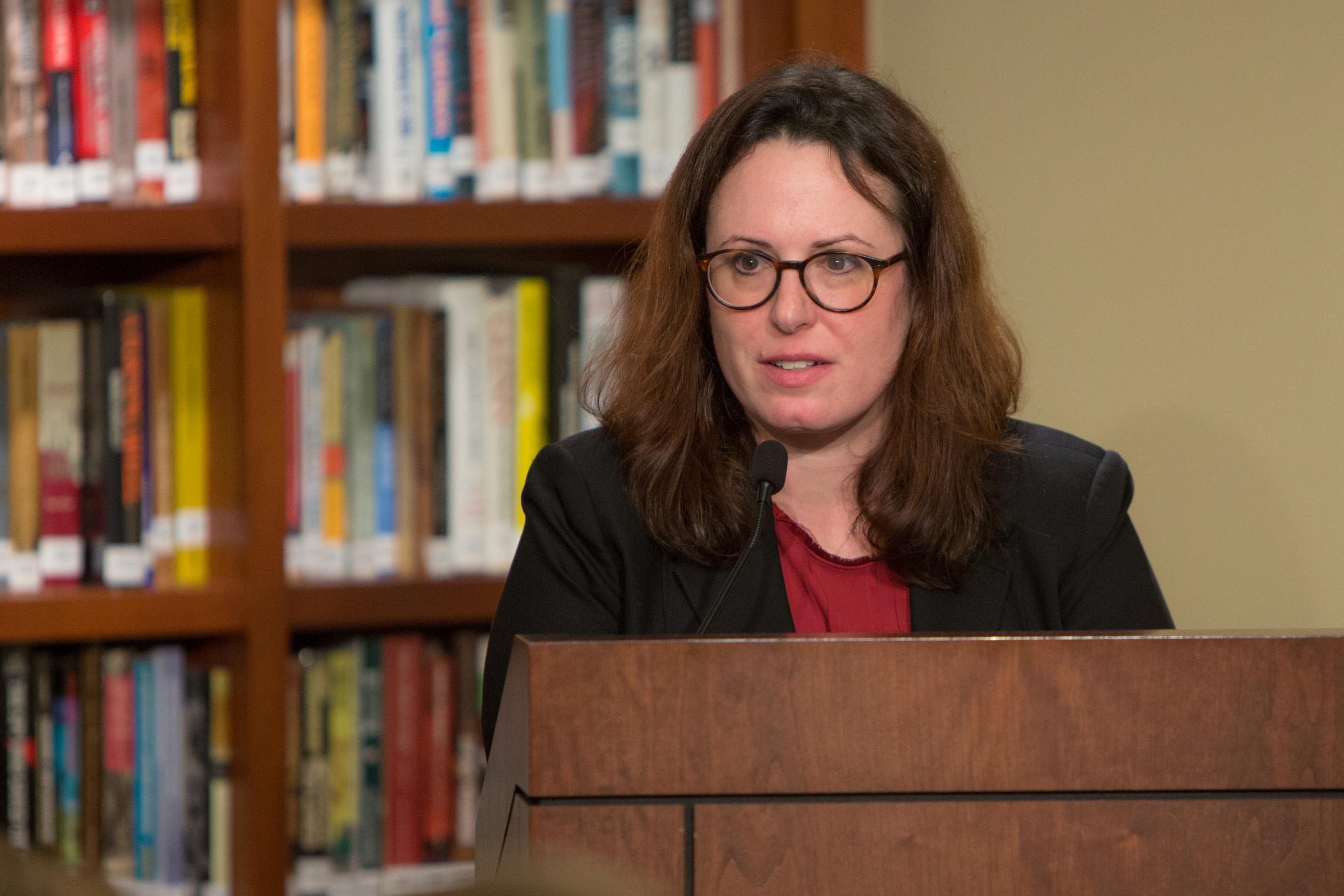
Maggie Haberman
In April, Nieman collaborated with The Harvard Crimson to host the 2017 Christopher J. Georges Conference on College Journalism, with more than 70 students from 22 college newsrooms attending. Keynote speaker Maggie Haberman, who covers the White House for The New York Times, offered special insights into what it’s like to report on the Trump administration. Other sessions featured Nieman Fellows and alumni, Frank LoMonte, former executive director of the Student Press Law Center, and the students themselves.
In the fall, we announced two important new fellowships:
- The Abrams Nieman Fellowship for Local Investigative Journalism will support up to three journalists who cover news in underserved communities in the U.S. They will be given an academic year at Harvard followed by financial support for public service fieldwork that may last up to nine months. We are deeply grateful to Nieman Advisory Board member Amy Abrams, whose Abrams Foundation will fund these fellowships. Interested journalists can learn more about the program and what we’re seeking from candidates in Nieman curator Ann Marie Lipinski’s Q&A with Nieman Lab’s Shan Wang.
- The Robert L. Long Nieman Fellowship for Turkish Journalists, offered in partnership with Turkish Philanthropy Funds (TPF), honors the memory of U.S. journalist, filmmaker and news executive Robert L. Long and will support Turkish candidates who are accepted for a Nieman Fellowship in the next three years.
As 2018 approaches, we are busy planning for Nieman’s 80th anniversary weekend and alumni reunion, which will take place October 12-14, 2018.
Nieman Publications
Throughout the year, Nieman provided some of the industry’s best reporting about journalism. Here are just some of the many stories journalists have turned to us for this year:
- At Nieman Lab, in addition to daily reporting about innovations in news and digital journalism, we launched our “Real News About Fake News” series, an important weekly report on data about misinformation, partisan content and news literacy.
- In Nieman Reports, we pointed the way forward for newsrooms examining harassment and sexual abuse investigations with the story “The News Industry Has a Sexual Harassment Problem. #NowWhat?,” written by 2017 Nieman Fellow Katherine Goldstein, who also contributed the summer story “Where Are the Mothers?,” an in-depth look at the issues facing working parents in newsrooms and the growing need for better work-life balance for all employees. Nieman Reports additionally covered threats to journalism with stories such as “The Israeli Press Under Pressure,” “Will the Trump White House Defend Press Freedom Abroad?” and “How Independent Russian Newsrooms Keep Reporting.”
- Nieman Storyboard continued to showcase exceptional narrative in articles ranging from how New York Times Magazine writer Nikole Hannah-Jones reports on racial inequality to a Q&A with BuzzFeed’s Anne Helen Petersen, who covered white supremacists descending on the idyllic town of Whitefish, Montana.
Learn more about Nieman publications and the stories we covered in 2017.
Journalism Awards
With our annual journalism awards, Nieman recognizes excellence in journalism in six categories.
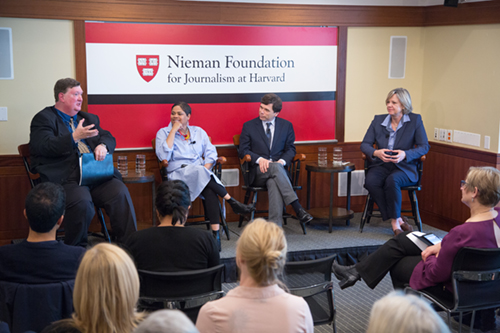
XXXX
This year, we celebrated the 50th anniversary of the Worth Bingham Prize for Investigative Journalism, honoring Chicago Tribune reporters Michael J. Berens and Patricia Callahan for “Suffering in Secret,” their series about abuse and neglect in Illinois group homes. A panel of past Bingham winners were on hand to mark the occasion, including investigative reporting all-stars Dana Priest, Michael Rezendes and Audra D.S. Burch; Worth Bingham’s daughter Clara Bingham, a Harvard grad, author and journalist like her father; and his wife Joan Bingham, a vice president at Grove/Atlantic, Inc.
Learn more about Nieman’s journalism awards.
Nieman Speakers
Throughout the year, we invited a wide variety of speakers to Nieman’s Lippmann House for seminars, shop talks, master classes and informal conversations. Scholars, award-winning journalists and media trendsetters shared their ideas, experiences and research in talks about newsroom innovation, audience engagement, social media best practices, digital storytelling and much more.
We also heard updates from our Knight Visiting Nieman Fellows, who came to campus to work on a range of projects to advance journalism.
A sampling of the many talks that took place at the Nieman Foundation in 2017:
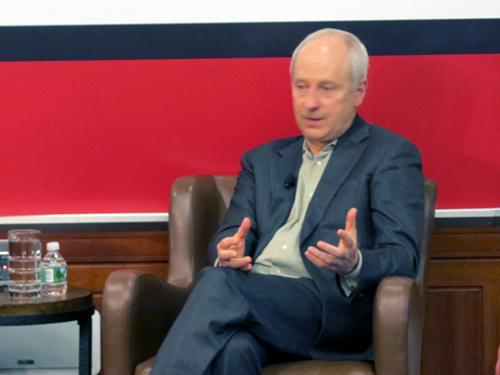
Michael Sandel
Political philosopher Michael J. Sandel, the Bass Professor of Government at Harvard and creator of the popular undergraduate course, “Justice,” asked fellows to explore why it’s right or wrong to include the word “lie” in news coverage of the new Trump administration.
Andrew Fitzgerald, who built and oversaw the global curation teams responsible for Twitter Moments, explained how Twitter can be used as a news-gathering tool.
Steve Jarding, a political consultant and lecturer in public policy at Harvard Kennedy School, conducted a master class in political rhetoric and persuasion and taught ways the press can fight perceptions of bias and win back trust.
Washington Post reporter David Fahrenthold shared what he has learned about using social media for research and new ways to cover the Trump administration.
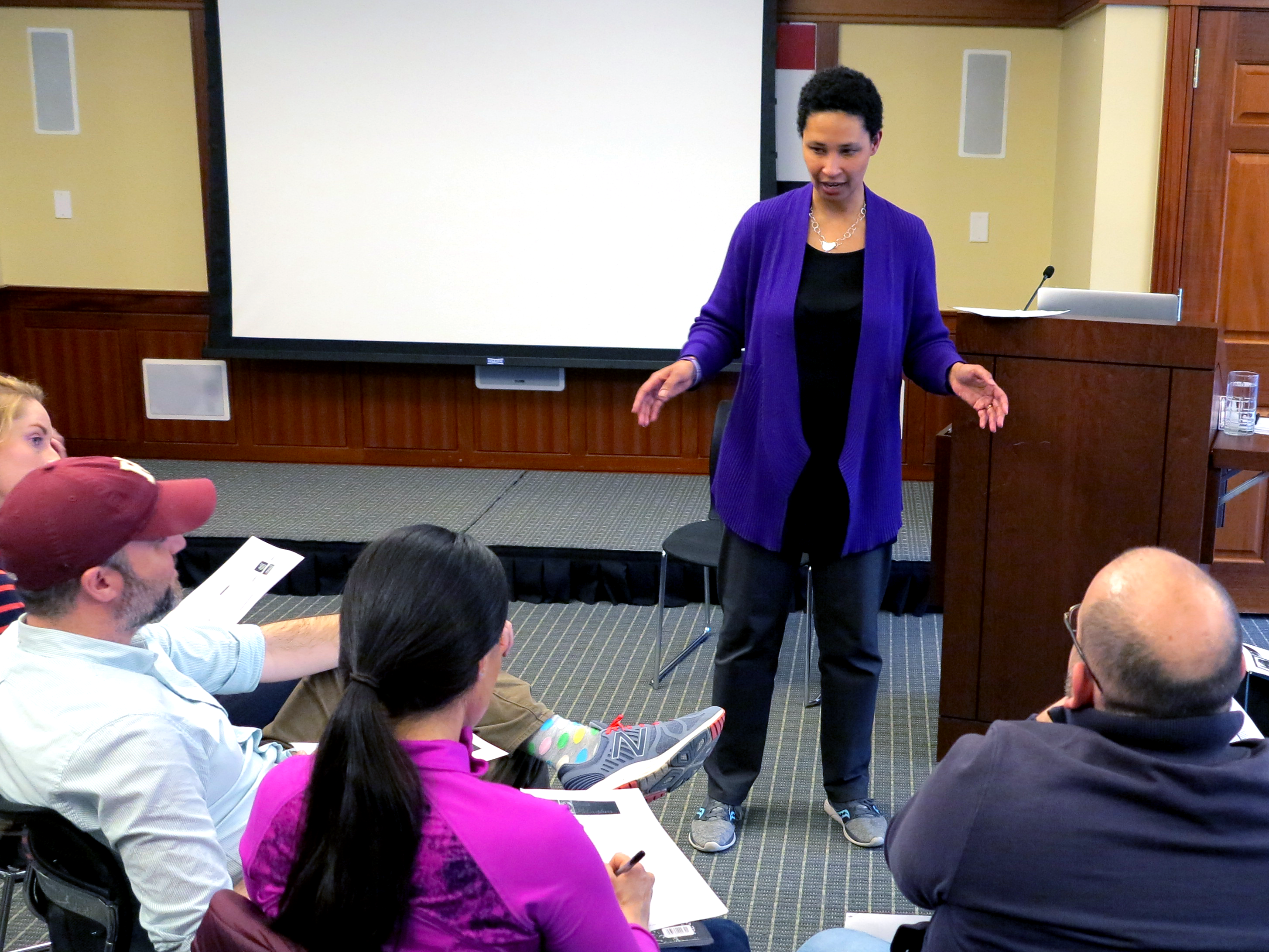
Danielle Allen
Danielle Allen, James Bryant Conant University Professor and director of the Edmond J. Safra Center for Ethics at Harvard, ran a workshop exploring new strategies for effective questioning.
Brian Mandell, senior lecturer in public policy and director of the Harvard Kennedy School Negotiation Project, taught his master class in negotiation.
Zachary M. Seward, who helped launch Nieman Lab and is now vice president of product and executive editor at Quartz, led a shop talk on the decisions and projects that have led to Quartz’s success.
Christopher Robichaud, lecturer in ethics and public policy at Harvard Kennedy School, led a seminar on journalistic ethics in the Trump era, using case studies of professional ethical and moral challenges submitted by the fellows.
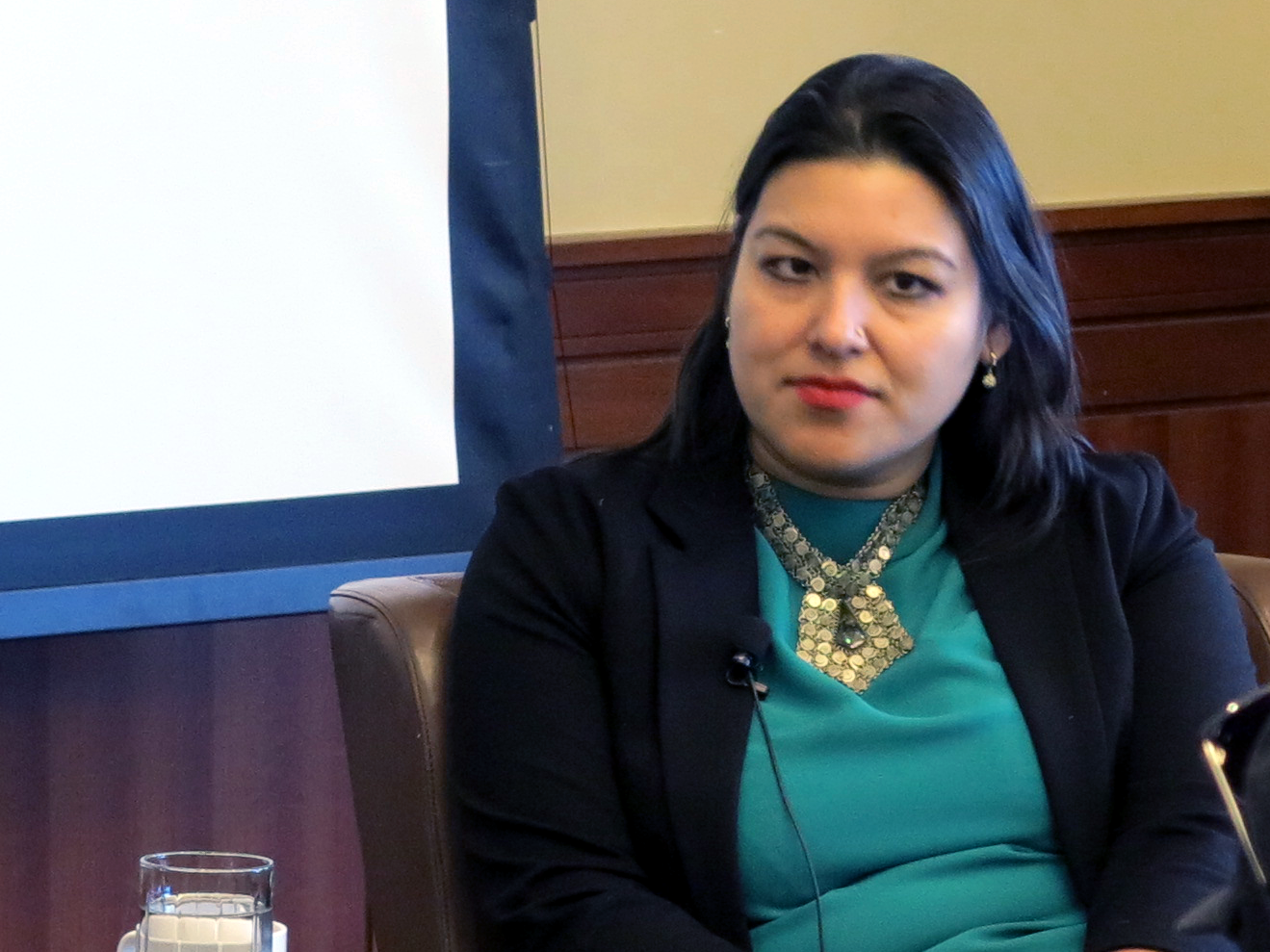
Mitra Kalita
Mitra Kalita, vice president for programming at CNN Digital, discussed lessons learned as a digital leader for organizations including the Los Angeles Times, Quartz, The Wall Street Journal, and Mint, a business paper in New Delhi, where she was a founding editor.
Robert Putnam, the Peter and Isabel Malkin Professor of Public Policy at Harvard and author of 14 books, including the best-selling “Bowling Alone: The Collapse and Revival of American Community,” led a seminar on the changes that have taken place in American society and politics in recent decades.
Marshall Ganz, senior lecturer in public policy at Harvard Kennedy School, ran an all-day workshop for the fellows on public narrative, a leadership practice rooted in community organizing.
Kevin Merida joined us for a talk about his work as senior vice president and editor-in-chief of The Undefeated, ESPN’s media platform exploring the intersections of race, sports and culture, which launched in May 2016.
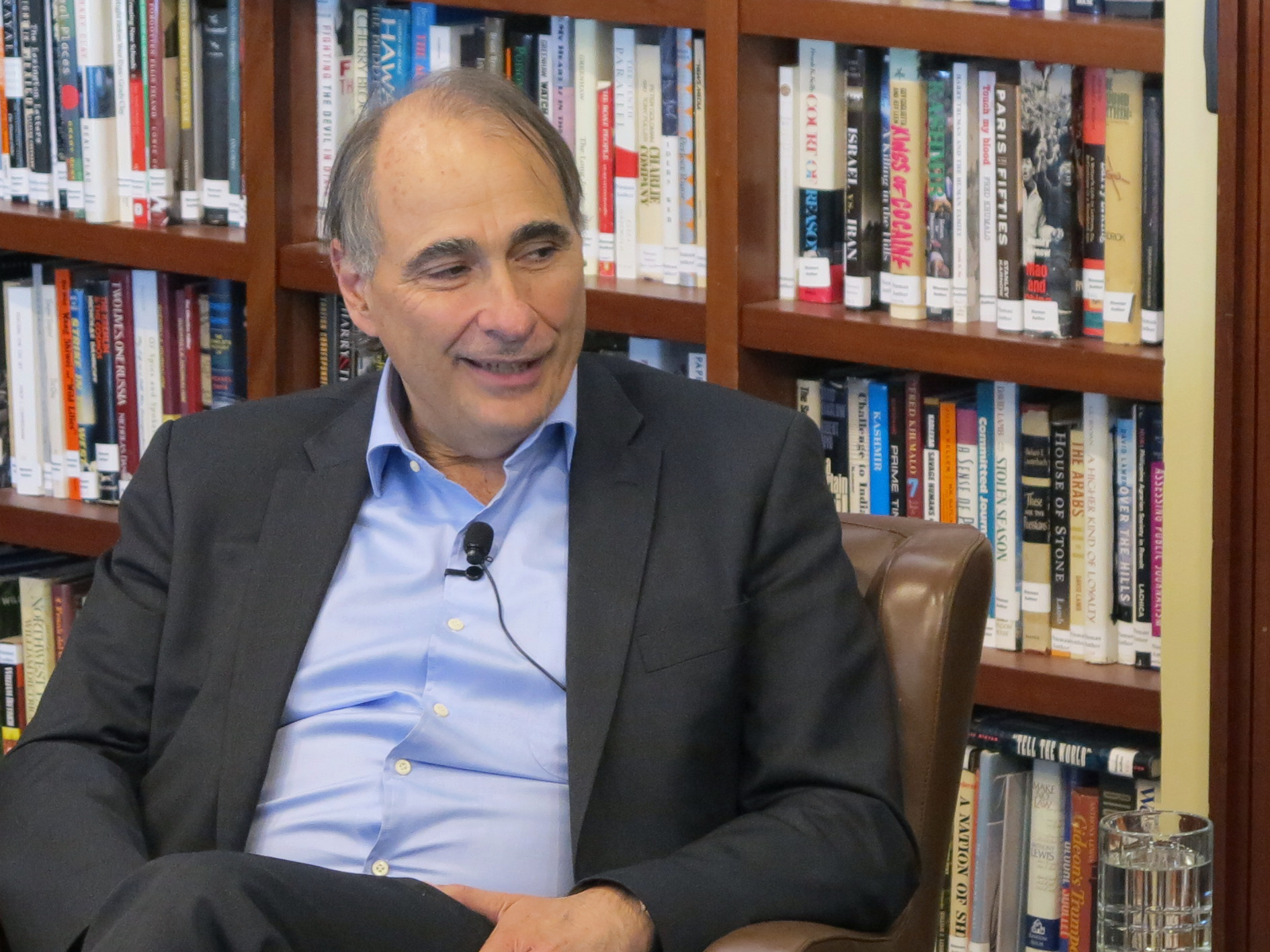
David Axelrod
David Axelrod, former chief strategist and senior advisor to President Barack Obama, who now serves as director of the University of Chicago Institute of Politics and a senior political commentator for CNN, joined Nieman curator Ann Marie Lipinski for a conversation in which he shared insights about presidential politics and journalism in the post-truth era.
Charlie Sykes, political commentator, MSNBC contributor and host of WNYC’s “Indivisible,” spoke about his work as a conservative talk show host and his book, “How The Right Lost Its Mind.
Cornel West, philosopher, political activist, author and commentator, who is currently a professor of the practice of public philosophy at Harvard Divinity School, discussed American society today and the need for civil public discourse at a time of increased divisiveness.
Pulitzer Prize-winning author and MIT writing professor Junot Díaz led a shop talk about his craft and the forces that have shaped his work.
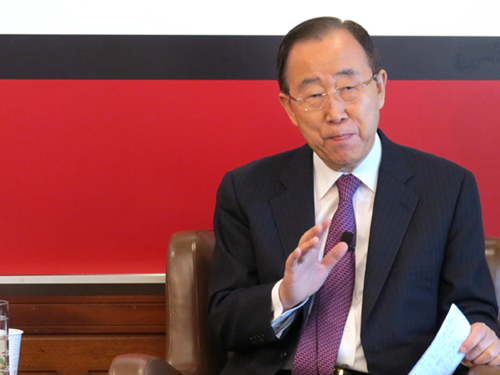
Ban Ki-moon
Former United Nations Secretary-General Ban Ki-moon discussed his work around the world and his plans for the future.
Vice News Tonight correspondent Elle Reeve visited to discuss her documentary “Charlottesville: Race and Terror” and how she gained access to white supremacists protesting in Virginia in August. Excerpts from her talk with former MSNBC executive producer and 2018 Nieman Fellow Jamieson Lesko can be found in Nieman Reports Live @ Lippmann article. Nieman Storyboard also annotated her work, weaving her comments with video clips.
Pete Souza shared his thoughts about working as the chief official White House photographer under President Obama, as a member of President Reagan’s photo staff and what has changed in Washington under President Trump. He joined Nieman curator Ann Marie Lipinski in conversation.
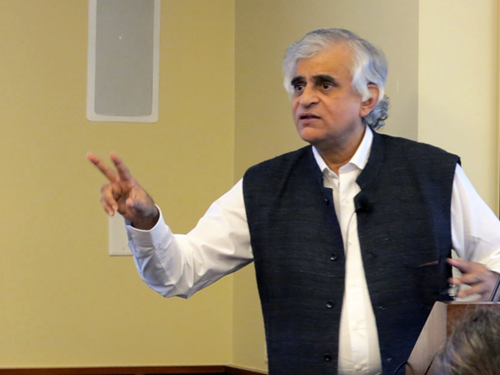
Palagummi Sainath
Palagummi Sainath, the founding editor of the People’s Archive of Rural India (PARI), spoke with 2018 Nieman Fellow Shalini Singh, a regulator contributor to the PARI and a founding member of the nonprofit that owns the site, about his work.
David E. Sanger, national security correspondent for The New York Times, adjunct lecturer in public policy at Harvard, and the Belfer Center’s first senior fellow for national security and the press, spoke with Canadian journalist and 2018 Nieman Fellow Michael Petrou.
2014-15 Knight Visiting Nieman Fellow Amy Webb, founder of the Future Today Institute and the author of “The Signals Are Talking: Why Today’s Fringe Is Tomorrow’s Mainstream,” discussed how she forecasts the future of journalism and some of the ideas she explored in her Nieman Reports article “AI Is Journalism’s Next Big Threat (or Opportunity).”
Dr. Gene Beresin, professor of psychiatry at Harvard Medical School and executive director of The Clay Center for Young Healthy Minds at Massachusetts General Hospital, spoke about his work with children and adolescents and weighed in on how the Goldwater Rule may impact both mental health professionals and journalists writing about President Trump.
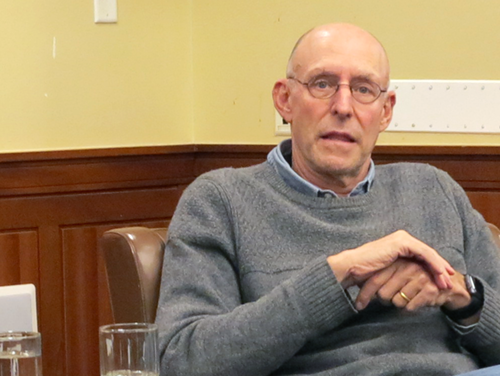
Michael Pollan
Michael Pollan—author, journalist and professor of journalism at the UC Berkeley Graduate School of Journalism and at Harvard—talked with fellows about his writing and recent work.
Fellows also visited the Frontline office at WGBH to talk with staff there about developing VR stories; traveled to Harvard Medical School to learn about the work being done in the lab of Pamela Silver, Elliot T. and Onie H. Adams Professor of Biochemistry and Systems Biology at HMS; and went to Harvard Business School to review a case study with HBS professor Steven Rogers, senior lecturer of business administration.
Other speakers this year included:
- Jill Lepore, the David Woods Kemper ’41 Professor of American History at Harvard University and a writer for The New Yorker
- Jonathan Walton, Plummer Professor of Christian Morals and Pusey Minister in Harvard’s Memorial Church
- Henry Louis Gates, Jr., director of Harvard’s Hutchins Center for African and African American Research
- Daniel Schrag, director of the Harvard University Center for the Environment
- David Barboza, a New York Times reporter and a 2016 Knight Visiting Nieman Fellow
- Luis Moreno Ocampo, the first chief prosecutor of the permanent International Criminal Court
